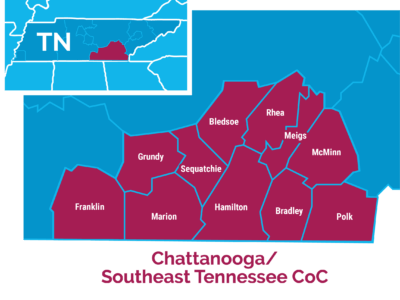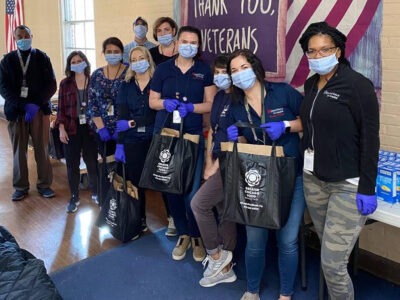How do you build strong data infrastructure that enables a community to reduce veteran homelessness across seven counties, 40 municipalities, and a population of 3.2 million? That’s the question the Metro Denver Homeless Initiative (MDHI) had to answer.
We talked with Matt Richard who served as the Data Design & Reporting Lead at the Metro Denver Homeless Initiative (MDHI), the regional Continuum of Care (CoC). In partnership with Built for Zero and the local Veterans Affairs (VA) medical center, MDHI developed a sub-regional approach to ending veteran homelessness.
MDHI is also the Homeless Management Information System (HMIS) lead agency for the region, which means they support data improvement efforts across nine subregions in the Metro Denver CoC.
In order to pull all the data together and achieve a real-time understanding of veteran homelessness at both the local and regional levels, MDHI knew they needed a strong data infrastructure. They faced several challenges that are common to many communities, including limitations with their HMIS software that made access and data reliability challenging and limited staff capacity. Furthermore, the VA Medical Center, a critical partner in their work, did not have access to HMIS.
This brief explains how Metro Denver worked to build a strong data infrastructure that enabled them to overcome many of these challenges. As a result, they have been able to improve care coordination, increase partner participation, and ultimately, harness the data they need for decision-making and quality improvement to support progress towards functional zero for veterans.
Finding HMIS software solutions
Across communities, existing software and technology are often reported as posing challenges, rather than acting as catalysts, for reducing and ending homelessness.
In order to collect data on people experiencing homelessness and the services they receive, communities rely on a tool called a Homeless Management Information System (HMIS), which is mandated by the U.S. Department of Housing and Urban Development. There is no one-size-fits-all HMIS software, however, and many communities struggle to use their HMIS software to collect and analyze the comprehensive, updated, person-level data needed to connect individuals with housing and equitably reduce homelessness. As a result, many communities engage in elaborate workarounds to meet their needs for quality data. Metro Denver experienced some challenges that Community Solutions has heard about from communities over the years.
Metro Denver’s HMIS software posed challenges for accessing data and created data reliability issues due to poor reporting tools. For several years, MDHI worked to supplement the HMIS with other solutions, like a software program for tracking housing placements and the Coordinated Entry System process. However, with core issues still unresolved, Metro Denver ultimately transitioned to a new HMIS software vendor in January 2019.
Despite all the challenges Metro Denver experienced throughout the multi-year process of identifying solutions and migrating HMIS software vendors, the team feels fortunate to have made the change. The new system was highly functional and robust, allowing the team to add custom fields, create targeted files for the fields associated with their by-name data, and connect those to their external data source built from HMIS.
However, the rapid growth of the community’s new HMIS software vendor caused some growing pains, including performance issues with the reporting tool, limiting their ability to take advantage of the data they had collected. In response, they purchased an additional reporting tool from their new vendor that has a live, real-time SQL connection to the back-end of the database.
In the Weeds
MDHI was selected for a Tableau Service Corps Mission Project in 2019. As part of the project, Tableau staff members with expertise in data analytics and visualization spent three weeks in Denver, providing training to help the MDHI team get the most out of the data they were now able to capture with their new HMIS software. This experience proved transformative for MDHI. Tableau Server allows the team to securely share and collaborate on their data sources, dashboards, and reports with agencies across the CoC. Moreover, with Tableau Server, the team can refresh the data that appears in their dashboards, such that changes are made to reflect the most up-to-date data in HMIS.
The transition to the new HMIS software converged with growing expertise within MDHI’s team to deploy Tableau, a data analytics and visualization platform, to create community dashboards that allowed them to share and visualize their data through community-facing dashboards.
An important outcome of these developments was an even higher level of engagement and interest in utilizing these tools.
“After switching software vendors, we have been able to increase the number of HMIS participating agencies by over 100% due to the increased functionality of the new system,” Richard said. “Currently, 74% of providers in the Metro Denver CoC participate in HMIS.
Streamlining systems and process in partnership with VA Medical Center
Coordination across providers in any region is critical to a community’s ability to collect, achieve, and harness quality data. In order to continue making progress toward functional zero for veteran homelessness, MDHI partnered with the Rocky Mountain Regional VA medical center to improve their ability to have a comprehensive, shared line of sight into the population of veterans experiencing homelessness and coordinate their care and support. This required improving the design and implementation of new procedures for data entry, sharing, and verification.
Prior to the migration to the new HMIS software, Metro Denver’s veteran by-name data was in a VA-owned spreadsheet, and VA staff did not have access to HMIS. This led to a challenging and time-consuming monthly process of reconciling discrepancies among different lists. For example, care coordination required using encrypted spreadsheets to manually calculate the metrics needed to reach a comprehensive and up-to-date understanding of the number of veterans actively experiencing homelessness each month.
In the Weeds
The transition of the veterans by-name list process to HMIS became possible when the CoC migrated to the new HMIS software. Moreover, MDHI became the lead HMIS agency for the CoC in 2018, allowing them to work with VA partners to get the appropriate agreements signed. In accordance with national guidance issued by the VA Homeless Program Office, access agreements were developed by the Colorado HMIS Statewide Collaborative and coordinated with VA leadership. With agreements in place – including an Agency Partnership Agreement, New Agency Setup Form, and Data Partner Agency Liaison Agreement – VA staff were able to access HMIS directly for the first time. An inclusive list of the default agreements used by Colorado’s Homeless Management Information System can be found on their helpdesk website.
Through close collaboration, MDHI and VA identified the fields needed in HMIS, created custom fields with clean inputs for each metric, and established workflows for the veterans by-name data that met the needs of veteran service providers.
“I’m hopeful that we’re starting to demonstrate the importance of this information – because HMIS is no longer a place people just go to enter their data, generate their federal reports.”
Matt Richard, former Data Design & Reporting Lead at MDHI
In January 2020, Metro Denver successfully moved the veteran by-name data process into HMIS and standardized the enrollment process for all veterans getting connected to MDHI. In addition to entering data into the internal VA data (which was held in Homeless Operations Management and Evaluation System, or HOMES), VA staff are now able to enter data directly into HMIS and review all veteran activity to make determinations on whether individuals should be added to the coordinated entry by-name list project for veterans. VA’s help in verifying the data with the HOMES database for quality assurance has made the process smooth and easy to operationalize.
Richard highlighted the pivotal role VA has played in driving this change alongside MDHI.
“I can’t say enough wonderful things about our VA partners,” he said. “None of the work we’ve been able to achieve would have been possible without them and their efforts to move this process into HMIS.”
Since January 2023, veteran service providers in Metro Denver have been provided login access to Tableau Server, enabling them to review updated numbers on veterans actively experiencing homelessness, as well as inflow and outflow over time, on a weekly basis. In addition to the dashboards, MDHI’s data team uses the reporting functionality of their HMIS software to share encrypted spreadsheets with veteran service providers who provide updated values for any incomplete or missing data points.
Harnessing monthly data for improvement
Every month, MDHI reports monthly metrics by pulling by-name data from a single anchor program in HMIS.
Through these reports, MDHI leverages care coordination by using the CoC’s data to generate a list of veterans for VA to review, determine eligibility, connect via outreach, and enroll them in the coordinated entry project when appropriate. The team schedules daily reports to VA, as well as features put in place by their HMIS software vendor, such as system-wide triggers that automatically exit veterans from the by-name data project when they either receive a housing move-in date or exit to a housing destination in any HMIS project.
After a long journey, MDHI now has the data infrastructure and technology to set up their HMIS data source in their Tableau server, refresh their script, and see updated numbers on a weekly basis. Richard described how these regular refreshes have helped the team catch and fix data quality issues, such as non-veterans being enrolled in the project or incorrect or complete information about VA eligibility status.
“The dashboards make disconnects like these readily apparent and, in some instances, have resulted in our team developing additional operational quality assurance reports,” he said.
MDHI knows which fields should be leveraged to reconcile activity in the nine subregions. The team has calculations that show the total number of people with activity in HMIS throughout the reporting period, as well as the number of those with activity who are experiencing homelessness based on their project type or available information on their enrollments.
“I’m hopeful that we’re starting to demonstrate the importance of this information – because HMIS is no longer a place people just go to enter their data, generate their federal reports,” Richard said.
Expanding Data Capacity
Until recently, MDHI had a small data team consisting of two data staff members: a Data Design & Reporting Lead and a Data Analyst. MDHI recently expanded their data team with the addition of a new Quality Assurance Specialist, as well as a Data Analyst, who they were able to hire with funding support from Community Solutions.
Moving Forward
Metro Denver is eager to extend their successful data-driven progress to non-veteran populations and use quality, real-time data to measure everyone experiencing homelessness and progress toward ending it. They hope to identify solutions to address the challenges of reconciling conflicting enrollment data in HMIS and counting non-veterans without administrative enrollment data in a feasible and data-driven way. Tracking outflow can be difficult, as every project is not required to track timely exits because of the infrequent nature of the services they provide. However, MDHI is planning to explore innovative calculations that reconcile discrepancies and maintain consistency month after month. With a larger data team, they are excited to use the additional staff capacity to advance this process.
Metro Denver is optimistic that with robust software, momentum, and dedication, they can overcome this next set of challenges and achieve their goal of achieving quality by-name data across populations. MDHI aims to create calculations and quality assurance reports to track the number of all populations experiencing homelessness across the Metro Denver CoC that can be replicated in each CoC in Colorado and have started conversations with data teams from around the state.




